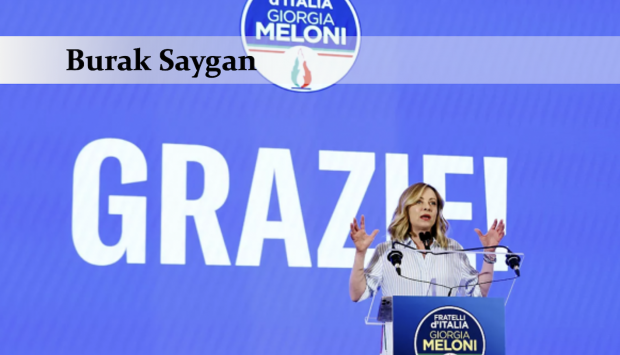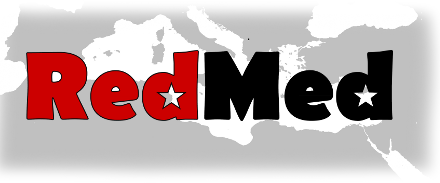Italian fascists’ European victory, again

The European elections showed the reflection of several Europe-wide tendencies in Italy, while also illustrating several peculiarities. First and foremost, the proto-fascist bloc in Italy consolidated itself as the main political force in the country. The fractured nature of the proto-fascists, hitherto arguably more pronounced in Italy than elsewhere, also shows tentative signs of coming to an end – in Italy just as in France and Germany. In this context, whereas no sort of revolutionary left appears on the horizon of Italian politics, the relative left-turn of the Partito Democratico (PD, Democratic Party) and that of the Alleanza Verdi e Sinistra (AVS, Green and Left Alliance) seems to have contributed to their revival. Finally, the results deliver the coup de grace to the long-agonizing pipe dream of an Italian Macronisme.
Consolidation of Italian fascism
The last decade of Italian politics has been nothing short of a roller-coaster. Once triumphant leaders who seemed to be poised to take Italian politics by storm were quickly relegated to irrelevancy before you could even say “prime minister.” A quick glimpse into the last three European elections leaves no doubt as to that. The wunderkind of 2014 European elections, Matteo Renzi, was already a footnote by the time Italians casted their votes in 2019, five years after leading his PD above the symbolic threshold of 40 percent. The 2019 reiteration of the same elections saw two brand-new success stories. Matteo Salvini’s Lega in Northern Italy and Luigi di Maio’s Movimento 5 Stelle (M5S, Five Star Movement) in the south dominated the elections with victories by healthy margins. Fast forward five years, di Maio is out of the picture – holding an EU position in the Gulf after his string of political failures – and Salvini’s control of his own party is on shaky ground, let alone any bid for the position of prime minister.
The governing Fratelli d’Italia’s (FdI, Italian Brotherhood) score of 28 percent might be more muted than their initial and rosy predictions over 30 percent. But in this particular Italian context, Giorgia Meloni and her FdI have reason to rejoice after staying at the top of Italian politics after two years in government and by increasing their score in 2022 by two percentage points to boot. Admittedly, the two years in power is still too short to say that Meloni is here to stay, but with its third electoral victory in a row (one for Lega and two for FdI), Italian proto-fascism starts to consolidate itself at the helm of the country. It is also significant that this last victory comes after a two-year stint in power, which Meloni herself acknowledged by saying that the victory in 2024 was more significant than 2022 because, in her words, “then we were a hope, this time they voted for who we are.”
Toward the end of fractures within the fascist camp?
Another significance of FdI’s victory is that it might constitute a step towards Italian proto-fascism overcoming its fractured composition – even though, at this point, we could talk about a strong sign rather than a certitude. So far, Italian proto-fascism has had two competing organizations for its leadership in Salvini’s Lega and Meloni’s FdI. Up until two years ago, the latter had lagged behind Salvini, while neither of the two were among the top contenders in the country’s politics, owing their prominence mostly to their alliance with Silvio Berlusconi’s Forza Italia (FI). In 2018, Lega leaped forward by surpassing FI and becoming the strongest partner in what was – and is – euphemistically called the “Centre Right” alliance. Just a year later, in European elections, Lega won a landslide electoral victory (http://redmed.org/article/still-resistible-rise-salvini). Since then, not least due to several amateurish mistakes by Salvini – such as taking secondary seats in a technocratic government, hence assuming a major political risk without reaping any direct political benefits from it – Meloni eclipsed Salvini, first in 2022 and now, for a second time.
Yet, our observation about Meloni overcoming competition stems not simply from the electoral results – hardly a reliable indication in a context as volatile as Italy in the Third Great Depression – but from the imminent implosion that Lega seems to face. Following the lightning-fast rise and fall of Salvini’s Lega, his leadership has been taking some serious flak from within his party. In the ultimate indication that Lega remains a house-divided, the party’s founder, Umberto Rossi, made public before the European elections that he would vote not for Lega but for the Forza Italia – which presented Marco Reguzzoni, one of the former leaders of Lega, as an independent candidate from its lists.
These elections, arguably, were the last chance for Salvini to make a strong showing. Salvini, well aware of the stakes, moved to flank FdI from its right, hoping that the rapprochement between Meloni and the European Commission’s leader Ursula von der Leyen – for long the anathema of Italian fascism – gave him a window of opportunity. In addition to a more forceful anti-immigration line, the most recent card in Salvini’s sleeve was Roberto Vannacci, a former decorated Italian general who made a name for himself after spewing out a hodgepodge of invectives against all sorts of minorities in the country. Vannacci, while formally remaining an independent, headed Lega’s lists in two out of five Italian jurisdictions in the European electiona. Salvini clearly perceived. Vannacci – who, according to the former, would be votatissimo (which could be rougly translated as “extremely well voted for”) – was clearly perceived by Salvini as the silver bullet out of his predicament, giving him a better electoral result and, by extension, a better position to negotiate from in his alliance with Meloni. Much to his chagrin, this bid failed spectacularly, and far from competing with FdI, Lega fell even behind FI, becoming the smallest partner in the tripartite “center-right” coalition for the first time in recent history.
This shifting balance of power within the alliance could not have been more favorable to Meloni. A tame but sizeable FI is a godsend boon to FdI, letting it tap into the traditionally conservative constituencies as part of the governing alliance while also giving the party veneer of spuriously respectable mainstream politics. In a way, what is currently unfolding in Les Républicains (the traditional Gaulist right-wing party in France), where the party’s sitting chairman declared himself favorable to an alliance with Le Pen’s RN, creating a sustained political scandal, paving the way for traditional right’s cooptation by fascism, came by default in Italy. In addition, Lega’s diminishing power, combined with its internal fissures, gives Meloni either the possibility of keeping it at arm’s length as a minor but harmless partner or seeing it disappear into oblivion. Enjoying the consolidation of her position as the main standard-bearer of the right and the elimination of the competition, Meloni herself stated after the elections that the “system is becoming a two-party system again, and it is a good thing.”
PD Redux
The 2024 elections also witnessed an uptick in the PD’s scores, giving it a jolt. The PD obtained almost one-quarter of the total votes, getting 21 European deputies (MEPs), making it the biggest party of the European S&D social-democratic group ahead of Spanish socialists and the German SPD. It is worth noting that the relative electoral success that cast PD as the main opposition party, by and large, comes at the heels of a left turn orchestrated in the party under the leadership of Elly Schlein. Not without a touch of irony, the zenith of this left-turn was PD’s support for the main Italian trade union federation CGIL’s call to hold a public vote to revoke the infamous Jobs Act – a bill that was represented the biggest onslaught against the working-class rights in Italy, adopted by none other than the PD ten years prior! As far as the prospects of PD leading a class-based opposition to emerging Italian fascism, color unconvinced. The PD is a party steeped in the vested interests of the Italian bourgeoisie, which makes it impossible to use it as a tool of working-class politics. However, this should not lead us to neglect the importance of voters reacting positively to a left-wing turn and an effort to speak to the working class. Whereas we do not have enough data at our hands to get a sense of the class composition of the voters turning towards the PD, already the mere fact that class-oriented left-wing positions faring better than the long-held centrist line of the PD should be more than enough to shatter the conventional wisdom that toothless “left” parties obtain better electoral scores.
Another sign showing the Italian public’s willingness to favor more radically left-wing solutions is the AVS’s score. Needless to say, we harbor no illusions as to the political project of the AVS, and we would like to believe that the numerous debacles in the last few decades inoculated even those who were gullible enough to jump onto the bandwagon of post-Leninist left. However, their electoral score, significantly higher than anything they could have expected before the election at just shy of seven percent, seems to be the direct result of their campaign revolving around Ilaria Salis. To recall, Ilaria Salis is an antifascist Italian teacher who is currently being judged in Hungary for opposing a neo-Nazi rally in Budapest and held under house arrest in the city. Carrying the cause of Ilaria Salis as the principal banner of their campaign, they saw a significant surge in their score. This, and the favorable returns of Schlein’s vocal – if limited to lip-service – support of anti-fascist causes, gives a tentative indication of an antifascist undercurrent in Italian politics, which could, and should, surge in the future.
The miserable utopia of Italian Macronism
A final note on Matteo Renzi is in order. The man, in and of itself, deserves no such attention and steadily drifts towards well-earned political irrelevancy. Yet the lessons this episode holds on broader tendencies of global politics in the Third Great Depression justifies this brief digression. As is well-known, the initial electoral victories of Emmanuel Macron in France were greeted by many a pundit as the resurge of “center” politics against the “far-right”, even as a new model. Not for nothing, Macron’s group in the European Parliament was grandiosely named Renew. Now, less than a decade later, in addition to the beating that Macron and his Renaissance received, these European elections delivered the final nail in the coffin of the reactionary utopia of Italian Macronism. Matteo Renzi’s Stati Uniti d’Europa (United States of Europe), as well as its another hard-to-distinguish replica of it, Azione, under Carlo Calenda’s leadership – both parties affiliated to Macron’s Renew Eurogroup – remained below the threshold of four percent, thus not sending any MEPs. Just before the elections Renzi was quipping that he would have to leave Rome soon (hinting his seat in the European parliament was all but locked) in his usual arrogant manner. Well, this should spare him the trouble of packing! But more importantly, this clearly shows that the so-called political center that Renzi tried to fill was already occupied by the FI and its ilk, obediently toeing the line behind the rising fascism. This should serve as a further reminder that wishing away the fascist menace by going back into the politics of yesteryear, in the age of the Third Great Depression, is nothing but a reactionary utopia.
The only realistic solution is to take the situation in the Third Great Depression on its own terms and produce the needed solutions. The last decade proved that palliative solutions—be it in the shade of the ecologist green or the Macronist yellow—to the current convulsions of world politics yield no results. Once again, after eight decades, the black banner of fascism should be countered by the red flags of the working class.













